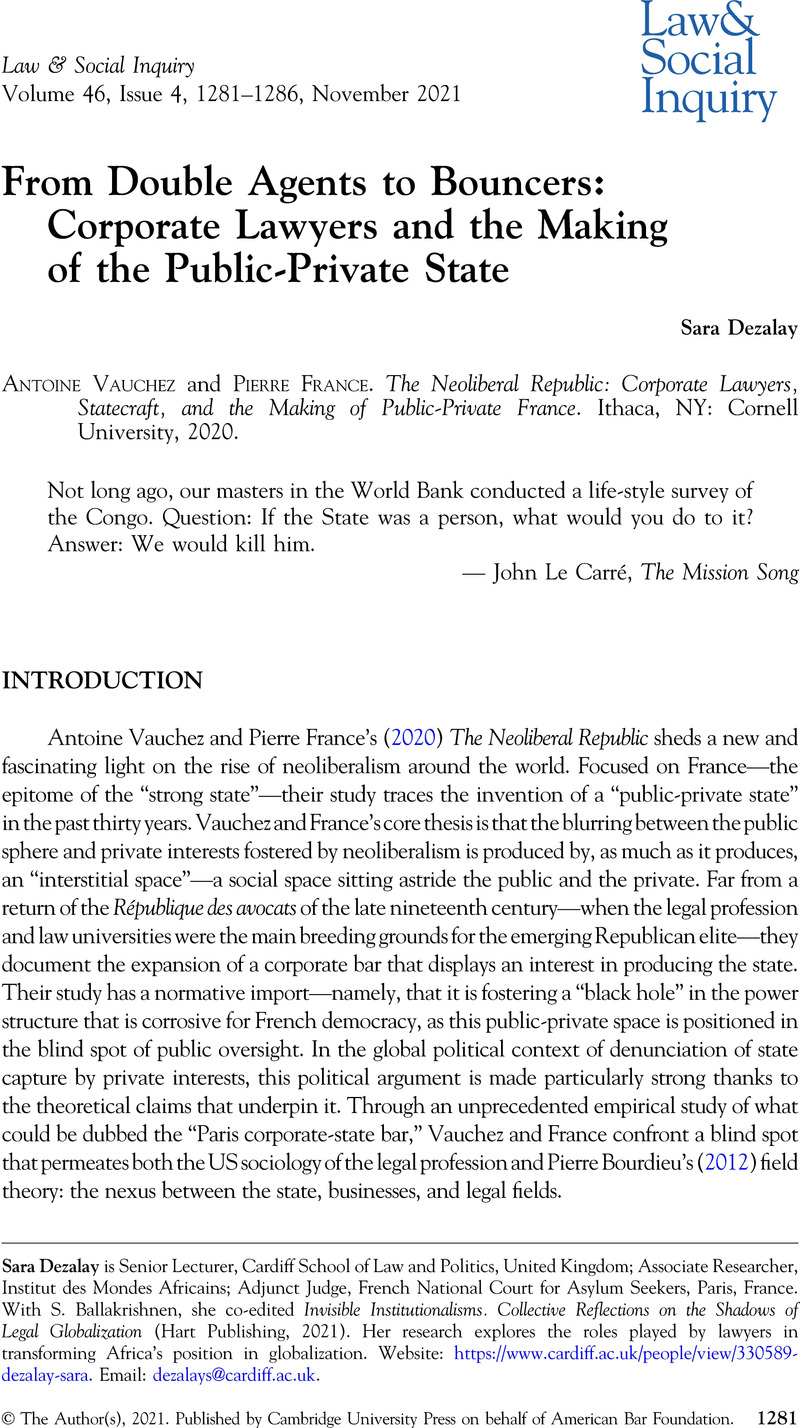No CrossRef data available.
Article contents
From Double Agents to Bouncers: Corporate Lawyers and the Making of the Public-Private State
Published online by Cambridge University Press: 11 November 2021
Abstract
An abstract is not available for this content so a preview has been provided. Please use the Get access link above for information on how to access this content.

- Type
- International Book Essays
- Information
- Copyright
- © The Author(s), 2021. Published by Cambridge University Press on behalf of American Bar Foundation
References
REFERENCES
Bourdieu, P. 1993. “Esprits d'État: Genèse et structure du champs bureaucratique”, Actes de la recherches en sciences sociales, 96–97, 49–62.Google Scholar
Cooper, F. 2014. Africa in the World: Capitalism, Empire, Nation-State. Cambridge, MA: Harvard University Press.CrossRefGoogle Scholar
Cutler, A. C., and Dietz, T., eds. 2017. The Politics of Private Transnational Governance by Contract. London, Routledge.CrossRefGoogle Scholar
Dezalay, S. 2016. “Weakness as Routine in the Operations of the International Criminal Court.” International Criminal Law Review 17: 1–21.Google Scholar
Dezalay, S.. 2020. “Le barreau ‘africain’ de Paris: entre Big Bang sur le marché du droit des affaires et sillons d’Empire.” Cultures & Conflits 119–20: 67–93.CrossRefGoogle Scholar
Dezalay, Y. 1992. Marchands de droit. La restructuration de l’ordre juridique international par les multinationales du droit. Paris: Fayard.Google Scholar
Dezalay, Y., and Garth, B. G.. 2002. The Internationalization of Palace Wars. Lawyers, Economists, and the Contest to Transform Latin American States. Chicago: University of Chicago Press.CrossRefGoogle Scholar
Eyal, G. 2013. “Spaces between Fields.” In Bourdieu and Historical Analysis, edited by Gorski, P. S., 158–82. Durham, NC: Duke University Press.CrossRefGoogle Scholar
France, P., and Vauchez, A.. 2017. Sphère publique, intérêts privés. Enquête sur un grand brouillage. Paris: Presses de Sciences-Po.CrossRefGoogle Scholar
Halliday, T., Karpik, L., and Feeley, M. M., eds. 2012. Fates of Political Liberalism in the British Post-Colony: The Politics of the Legal Complex. Cambridge, UK: Cambridge University Press.CrossRefGoogle Scholar
Heinz, J. P., Laumann, E. O., Nelson, R. L., and Salisbury, R. H.. 1997. The Hollow Core: Private Interests in National Policy Making. Cambridge, MA: Harvard University Press.Google Scholar
Hibou, B. 1999. “La ‘décharge’, Nouvel Interventionisme.” Politique africaine 73: 6–15.CrossRefGoogle Scholar
Jauvert, V. 2018. Les intouchables d’État. Bienvenue en Macronie. Paris: Robert Laffont.Google Scholar
Medvetz, T. 2012. Think Tanks in America. Chicago: University of Chicago Press.CrossRefGoogle Scholar
Rostain, T., and Regan, M. C.. 2014. Confidence Games. Lawyers, Accountants, and the Tax Shelter Industry. Cambridge, MA: MIT Press.CrossRefGoogle Scholar
Vauchez, A. 2008. “The Force of a Weak Field: Law and Lawyers in the Government of Europe (for a Renewed Research Agenda).” International Political Sociology 2, no. 2: 128–44.CrossRefGoogle Scholar
Vauchez, A., and Pierre, F.. 2020. The Neoliberal Republic: Corporate Lawyers, Statecraft, and the Making of Public-Private France. Ithaca, NY: Cornell University.Google Scholar




